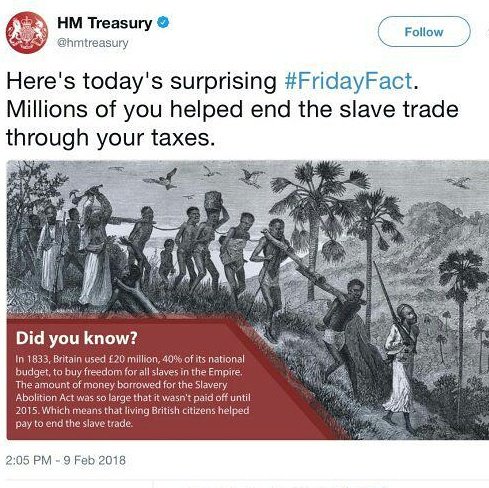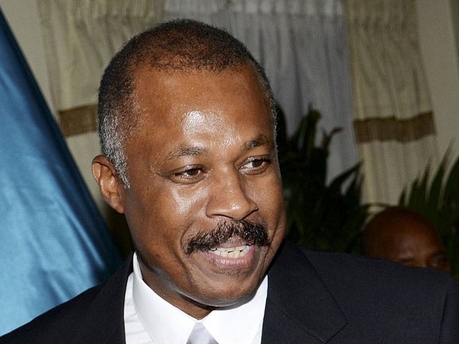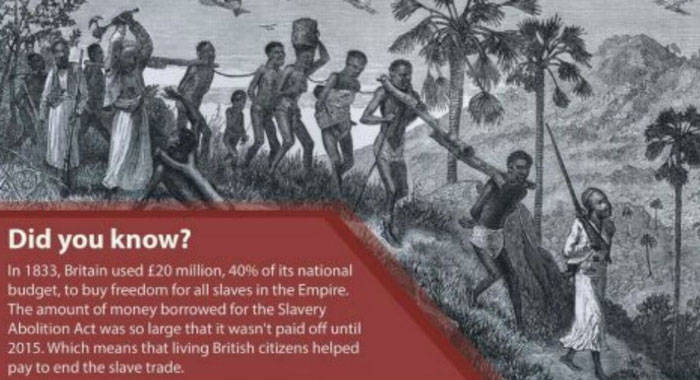A loan that the British government took to pay slave owners for the abolition of slavery in 1834 was not fully repaid until 2015, further strengthening the claim by a number of Caribbean nations for reparations for slavery.
Vice-Chancellor of the University of the West Indies (UWI) and Chair of the CARICOM Reparations Commission, Sir Hilary Beckles disclosed this at a press conference in Kingston, Jamaica on Wednesday.
The purpose of the press conference was to confront claims by the British Government’s Treasury posted via a #FridayFact on its official Twitter channel on Feb. 9, 2018.
The tweet, which was shared with the HM Treasury’s 318,000 followers, read: “Millions of you helped end the slave trade through your taxes”.
Although it was subsequently deleted, the tweet triggered reactions by various interest groups and captured the attention of the British media and the CRR at UWI.

The commission chair noted that Britain had argued against reparations saying they could not apologise or provide compensation for slavery and the slave trade because it was not illegal at the time and it also took place a long time ago.
With the new discovery about the slavery loan, Sir Hilary said it meant that for one 180 years, British citizens had been repaying the slavery abolition loan, which made it a present-day issue.
Of major concern was the fact that this meant that taxes from persons in the Caribbean Diaspora in the United Kingdom had also been used to repay the loan.
“We consider this to be an immorality… it is the greatest act of political immorality,” Sir Hilary said.
He also questioned whether there may have been a link between his presentation on reparations to the House of Commons, Parliament of Great Britain in July 2014 and the timing of the repayment of the loan, which subsequently happened in February 2015.
Sir Hilary also drew the audience’s attention to the significance of the value of the money in today’s economy.
He said the 20 million pounds in 1835 would be valued at approximately 15 billion pounds today. Additionally he said the amount paid to the slave owners represented 40 per cent of Britain’s national public expenditure at the time, which could be translated to be 40 per cent of the current national budget.
If calculated today, this would be approximately 240 billion pounds.
He also pointed out that the total amount that was to be paid for the abolition of slavery was actually 47 million pounds.

Sir Hillary explained that the British Parliament actually paid 20 million in cash to the plantation owners and then stipulated that the enslaved should work for an additional six years for free under the Apprenticeship period, to pay off the balance of 27 million pounds.
This, he said, meant that the British Parliament did not, in fact, pay for the abolition of slavery but instead the enslaved Africans paid the majority of the money for their freedom.
For these unjust provisions and the classification of the enslaved Africans as “property” and “chattel,” Sir Hilary characterised the Abolition Act of 1834 as the most “vile and racist piece of legislation in the history of mankind.”
He also pointed out that the British Parliament chose to implement an economic model for granting freedom that ensured the transfer of the wealth of the Caribbean back to Britain, using the cash liquidated from slavery.
He revealed that research into the archives of the Bank of England, HM Treasury, and the Rothschild Merchant Bank shows that the British Government had been refinancing the slavery abolition loan over the past 150 years to fuel economic growth in Britain, with the last refinancing done in 1927.
He said that Britain owed the Caribbean a comprehensive development programme and should repay the money extracted from the Caribbean, which has contributed to the burden of poverty which most of our countries face. He urged the Region to take a stand on the matter.
Other speakers at the press conference were Director of the CRR at UWI, Professor Verene Shepherd, Member of the Jamaica Reparations Committee, Lord Anthony Gifford, and Jamaican Minister of Transport and Works, the Michael Henry.







More rubbish the money was used to buy freedom for slaves, and the owners were paid half of what they paid for the slaves. Had the Brits not brought the slaves there may still be slavery today. Which in the case of Saint Vincent and the Grenadines there still is a newly created slave class whilst the whole island of Saint Vincent becomes the plantation of a political dynasty.
How this man is vice chancellor we will never know, his rantings and workings out if not dunce like may well be designed to sell a few more of his books.
I cannot see how this information, namely that the money raised as a loan from bankers was not fully repaid until recently, strengthens the claim for reparations. Sir Hilary knows full well, I am sure (and if he doesn’t then he needs a few lessons in History of Slavery 101) that although the Emancipation Act did specify that the slaves were expected to work as apprentices for six years, the Apprenticeship System, in fact, was ended after four years. Because it just was not working. The former slaves did not take kindly to a continuation of slavery by another name, and their rebellious activities finally led the British government to end the so-called Apprenticeship in 1838, four years after the passage of the Emancipation Act in 1834. So to claim that the ex-slaves paid, through their labour, £27 million, or more than half the cost of emancipation, is disingenuous to say the least.
Furthermore, I do not see how even the fact that the final payment of the loan was made only recently, strengthens the claim for reparations. So the descendants of slaves migrated to the UK, worked and paid taxes there. But in return, they received medical care under the NHS, and opportunities to work and better their conditions (for example, I know of several who benefited from student grants to go to Universities). So yes they paid taxes, but their taxes were not used exclusively to repay the loan which compensated slave owners. How does one work out what percentage of the taxes paid by migrants can be assigned to the repayment of that nineteenth-century loan?
In addition to which, we are no longer slaves. Nobody forced colonial peoples to migrate to the UK. Migrants from the then colonies went to the UK because they thought that they could do better there than at home. Some did, some did not. There was prejudice. There was bigotry. But that existed back home in the various colonies as well. Migrants fought against these prejudices; but let us not forget, so did many British people, just as many fought against slavery. And today, although the UK is by no means perfect, it is certainly far better than it was in the 1950s and 1859s.
Quite frankly, I do not think that these reparation demands will get anywhere. Who is going to force any British government to pay reparations? The US? Which did not free its own slaves until almost 30 years after emancipation in the British colonies? Where slaves were promised forty acres and a cow, if they fought for the Union army in the Civil War – and got nothing? And where the former slave states soon enacted Jim Crow laws which forced ex-slaves into bondage that was slavery in all but name? Does anyone really think we could get that government to support a demand for reparations? Dream on!
Sorry, the last sentence in the third paragraph should read in the 1940s and 1950s.